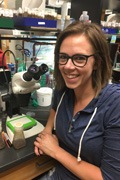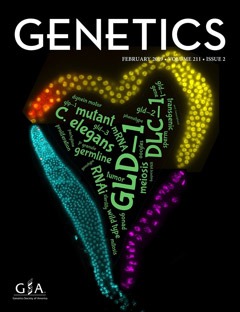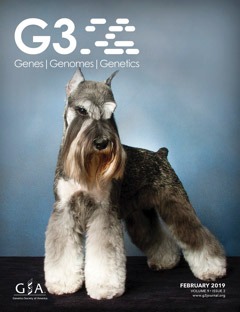2025 Fly Board Election Candidates and Ballot
To cast your vote, you will need to create an account or log in at the link below using an email address and password. This helps the Fly Board ensure a fair election. You do not need to have an active GSA membership to vote in the election. Elected members start their term immediately after the 66th Annual Drosophila Research Conference taking place March 19–23, 2025.
Please log into your GSA Account using the link above. You will see the option to vote in the Fly Board Election. Follow the link and fill out your choices using the form. Your ballot will be submitted as the deadline to vote passes. Until that time, you may change your votes.
You will receive an email confirming your ballot has been submitted (please check the spam folder). If you have technical difficulties, email society@genetics-gsa.org.
Candidate Statements and Biographical Information
Read each candidate’s statement and biographical information at the links below. Return to this list using the “Return to Top” links.
Representatives
Vote for one in each section
California Representative
Katherine (Katie) Thompson-Peer
Mid-Atlantic Region Representative
Asia Representative
Europe Representative
Latin America Representative
Erika Bach
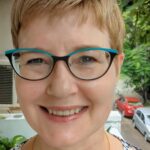
Professor, New York University Grossman School of Medicine
Candidacy Statement
I am running for President of the Fly Board because of my profound appreciation of the power and breadth of Drosophila genetics, the fly community’s development of tools that benefit all fly labs, and the generosity of the fly community.
I was first exposed to the amazing world of Drosophila research as a postdoctoral fellow in Norbert Perrimon’s lab at Harvard Medical School. Prior to that, I studied cytokine/JAK/STAT signaling during mammalian immune responses as a doctoral student in Robert Schreiber’s lab at Washington University School of Medicine (1991–96). As a postdoc in 1997, I decided to study the JAK/STAT pathway in a tractable genetic organism, and my postdoctoral work was the first to establish the important role of the JAK/STAT pathway in regulating growth control in developing fly tissues. Since 2002, I have led my own lab at New York University Grossman School of Medicine, and I am now a Full Professor. My lab’s research has moved away from growth control and is now focused on stem cell competition, lineage plasticity, and aging in the Drosophila testis. Working in Drosophila allows the researchers in my lab to ask critical questions about cellular identity, competitive interactions between cells, and stem cell-niche interactions that would not be possible in other model systems.
I am devoted to mentoring trainees and bringing new folks into the world of Drosophila research, and I have trained dozens of budding Drosophila researchers (high school students, undergraduates, graduate students, and postdocs). Several trainees from my lab now have their own labs using Drosophila as a model system. I am also passionate about service to the Drosophila community: I was the Chair of the Organizing Committee for the 2022 Fly Meeting in San Diego, I served as mid-Atlantic representative to the Fly Board (2018–2021), as 2014 Chair of the Larry Sandler Committee, and as a member of the Fly Board Elections Committee (2022–2023). I am currently a member of the Organizing Committee for the Drosophila Crete Meeting (2020–2026). I care deeply about graduate education and NIH support for PhD training programs. From 2013 to 2022, I was the director of a T32-funded PhD program. I renewed this T32 and was able to obtain an additional slot because we recruited many diverse PhD students to the program.
I would be honored to serve as Fly Board President. If elected, I would passionately advocate for increased funding for Drosophila (and other model organisms) at the level of individual labs, collaborative projects, and essential databases (i.e., Flybase). I would continue efforts to bring young scientists from many backgrounds into Drosophila research and to ensure that the Drosophila community continues to be inclusive, welcoming, and vibrant.
Nasser Rusan
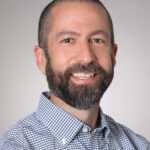
Senior Investigator, National Heart, Lung, and Blood Institute, National Institutes of Health
Candidacy Statement
I moved to the U.S. in 1996 to attend the University of Massachusetts at Amherst, where I completed my BS in 2000 and PhD in 2005. There, I studied the mechanisms of mitotic spindle assembly and developed an obsession with cytoskeletal dynamics. My introduction to the Drosophila world began at the University of North Carolina at Chapel Hill when I joined Mark Peifer’s lab for my postdoc. There, I merged my cell biology background with genetics and development to push the limits of live cell imaging in the fly brain.
In 2011, I was fortunate to start my lab at the National Institutes of Health (NIH) where I initially focused on studying asymmetric stem cell division. However, in the past few years, we have switched gears quite a bit to studying spermatogenesis and developing new tools and methods to model rare human diseases. It’s been quite a journey over the past 15 years at the NIH, not just scientifically, but I have also had the great pleasure of working with over 30 outstanding lab members. Moving into fly research has transformed me as a scientist, in large part because it introduced me to the unbelievable Drosophila community. One would be hard-pressed to find a more welcoming group of scientists who make newcomers feel right at home. This environment has been so important for me and my lab members, that the fly meeting has become the key conference for us to attend.
I’ve been attending the Annual Drosophila Research Conference for almost 20 years, during which I have had the privilege of serving the community in several ways. From 2014 to 2019, I served as the chair of the Drosophila Image Award, where I focused on increasing participation of both committee members and contributors. In 2021, I chaired the 62nd Annual Drosophila Research Conference. I am very proud to have worked with a fantastic committee to implement a wide range of new initiatives, including the first-ever DEIA plenary sessions, restructuring the scientific topics surrounding the concurrent sessions and posters, and extensively reshaping the process of selecting session chairs. Born out of organizing the 2021 meeting was the goal of establishing the Drosophila Community Award, which we presented to and was strongly endorsed by Fly Board in 2022. I am particularly proud of this award as I serve on its selection committee and see just how much the community has championed its colleagues who don’t typically receive public recognition. I am also a current member of the Bloomington Drosophila Stock Center Advisory Board and a loyal attendee of the annual meeting. Being selected as a plenary speaker for The Allied Genetics Conference 2024 was the biggest honor of my career until I was humbled by the recent nomination to run for president of fly Board. My motivation in all leadership roles has been to expand reach and level the playing field in creative and unconventional ways.
My main goal, if elected president, would be to first continue the hard work of past presidents by seeing their initiatives to fruition. I also hope to contribute in meaningful ways by identifying opportunities to support and enact the Fly Board mission, including new ways to facilitate networking, expanding GSA membership, and shoring up self-nomination for fly meeting contribution and Fly Board positions. I am truly thankful for the fly community and will always do my best to help in any way possible, whether as president or not.
Artyom Kopp
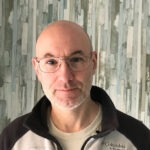
Professor, University of California, Davis
Candidacy Statement
I became immersed in the Drosophila community within a week of coming to the U.S. as a graduate student, and received unique mutant strains from several labs before I could speak proper English. I was immediately impressed by the openness of the fly community and everyone’s willingness to share information and materials. This is the spirit that I have always tried to maintain in my own work.
I am an evolutionary developmental biologist, so I have spent my entire career straddling and jumping between evolutionary/comparative and developmental/molecular research. I have found that if I tell developmental biologists that I study evolution, and evolutionary biologists that I study development, nobody will judge me too harshly. I did my PhD in developmental biology with Ian Duncan at Washington University. That training gave me a strong appreciation for the beauty of classical genetics and the importance of stock collections in Drosophila research. My postdoc stint with Sean Carroll at the University of Wisconsin further increased my belief in the value of collaboration across disciplines. I’ve been a faculty member in the Department of Evolution and Ecology at the University of California, Davis since 2002; at this point, I have lived in California longer than anywhere else in the world. Research in our lab uses developmental genetics and genomics to gain a deeper understanding of the molecular pathways that control animal development. At the same time, comparative approaches help us understand how these pathways evolve, and what changes in these pathways are responsible for the origin and diversification of new structures and processes. While I am a firmly wet-bench biologist myself, I collaborate enthusiastically with experts in computational fields, quantitative genetics, and phylogenetics.
The Annual Drosophila Research Conference is always a highlight of my year—I have only missed two since 1993. For an interdisciplinary biologist, these meetings are a great opportunity to see the latest advances in everything from cell biology to population genetics, not to mention the new technological developments and community resources. I have been involved, on and off, in organizing the annual “Everything you ever wanted to know about sex” workshop at the Drosophila and TAGC meetings since 2008, and acted as a co-organizer of the 2022 Fly meeting. I have reviewed grant proposals in both evolution and development for NIH and NSF along with eight international agencies, and manuscripts for more than 30 different journals ranging from “pure evolution” to “pure development,” with everything in between. I have taught classes ranging from molecular biology to evolution to transgenic methods to Drosophila genetics. My administrative experience includes stints as the director of the Center for Population Biology at UC Davis and chair of the college’s Faculty Executive Committee. The Drosophila community is a unique superorganism that is much more than the sum of its parts. Like any organism, it evolves to adapt to a changing environment, and it would be a privilege to contribute to its evolution.
Katherine (Katie) Thompson-Peer

Assistant Professor, University of California, Irvine
Candidacy Statement
I am an assistant professor in the department of Developmental and Cell Biology, within the School of Biological Sciences at the University of California, Irvine. My lab, established in 2019, studies how neurons can regenerate dendrites after injury.
I’m a third generation San Francisco native and grew up in the Bay Area. After I earned my BA from the University of Pennsylvania, I joined Alex Kolodkin’s lab at Johns Hopkins School of Medicine in 2003 for a two-year technician position, using both Drosophila and rodents to study axon guidance. During this time, I fell in love with the elegance of Drosophila genetics. Alex was generous enough to send me to my first academic conference, the Annual Drosophila Research Conference in Washington, DC in 2004. It was like trying to drink from a firehose, there were so many fascinating talks and approaches. After two years at Hopkins, I moved to Harvard Medical School for my PhD, working with Josh Kaplan to study neuronal development in C. elegans. I next joined the labs of Yuh-Nung and Lily Jan for my postdoc at the University of California, San Francisco, from 2012 to 2019. Returning to Drosophila (and returning to the Bay Area) was like riding a bike, and being surrounded by so many outstanding geneticists allowed me to quickly get up to speed. Eventually, I moved to UC Irvine to establish my own lab and train the next generation of scientists.
My lab studies how neurons can regenerate dendrites after injury, using Drosophila genetics and microscopy. We have published papers on how neurons detect injury to their dendrites, how injury induced regeneration could be used to overcome neurodegeneration, and how integrin adhesion to the ECM is faulty in fly models of Huntington’s disease. I have had one graduate student defend their PhD and currently have one postdoc, four grad students, one master’s student, a technician, a co-mentored PhD student, and four undergrads in my lab. We are interested in the cell biological regulation of dendrite regeneration, in developing and aged animals, both cell-autonomously and cell-non autonomously.
Most recently, I co-chaired a session at the 2023 Annual Drosophila Research Conference in Chicago and ran a networking hotspot for LGBTQ Drosophila geneticists. I taught a course on the Neurobiology of Drosophila in 2024 at the Cold Spring Harbor Labs. I was a GSA Presidential Member in 2023. I am interested in serving on the Fly Board, representing my home state of California and Hawaii, to advocate for diversity, equity, and inclusion initiatives, especially in this time when they are coming under attack; to promote culturally-relevant science communication so that we can better inform our communities of the value of scientific research in ways that make sense to audiences; and to center trainees in our decisions so that the next generation of Drosophila scientists will be ready and excited to make the next great discoveries.
Erika Matunis
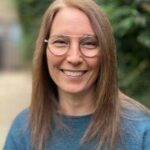
Professor, Johns Hopkins University School of Medicine
Candidacy Statement
I am a Professor in the Department of Cell Biology at the Johns Hopkins University School of Medicine. My research centers on stem cell biology, specifically the mechanisms that regulate stem cell identity and their interactions within their niche. Born in Fairbanks, Alaska, and raised in Spokane, Washington, I received a BS in Biology from Pacific Lutheran University, which fostered my deep appreciation for primarily undergraduate institutions. I earned her PhD in Molecular and Cell Biology from Northwestern University, studying heterogeneous nuclear ribonucleoproteins in Drosophila with Dr. Gideon Dreyfuss. During my postdoctoral work with Dr. Stephen DiNardo at the Rockefeller University, I developed the fly testis as a model system for stem cell biology.
In my first independent lab at the Carnegie Institution, my team discovered that differentiating cells can dedifferentiate into stem cells upon damage. In 2002, the Matunis lab moved to the Johns Hopkins University School of Medicine, where I was promoted to Professor in 2013. The Matunis lab continues to study the stem cells sustaining spermatogenesis in Drosophila, investigating how signals from neighboring cells control stem cell renewal or differentiation, and how spermatogonia reverse differentiation to become germ line stem cells again. Over the past two decades, the lab has welcomed nearly 80 mentees at various career stages and has contributed to community-wide projects including the protein trap collection and the Fly Cell Atlas.
As a science educator, I engage with diverse audiences to share her enthusiasm for Drosophila research, currently teaching fly genetics to mammalian reproductive biologists in the Fundamentals of Reproduction (FIR) course at Woods Hole. I have also served as a standing member of the National Institutes of Health’s Cellular, Molecular, and Integrative Reproduction Study Section (2016–2020) and as an advocate for Drosophila research at several NIH events (2013, 2015, 2019). I co-organized the 53rd Annual Drosophila Research Conference in Chicago (2012) and served as a GSA elected board member (2016–2019) and Secretary (2019–2021), chairing the Awards Audit Task Force to diversify the Society’s awards. I currently serve on the GSA Publications Committee and would be honored to represent the Mid-Atlantic region on the Fly Board.
Prash Rangan
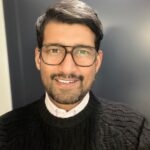
Associate Professor, Icahn School of Medicine at Mount Sinai
Candidacy Statement
I joined the Icahn School of Medicine at Mount Sinai three years ago, as an Associate Professor in the Department of Cell, Developmental, and Regenerative Biology. Before this, I spent nine years as a faculty member at the University at Albany, SUNY, building a research program that reflects my passion for understanding germline development. My interest in RNA biology and developmental biology was ignited during my PhD at Johns Hopkins University. Conversations with fly biologists and symposium talks opened my eyes to the potential of Drosophila as a model system, inspiring me to pursue a postdoctoral fellowship in Ruth Lehmann’s lab. There, I was captivated by the power of genetics and the thrill of uncovering new biology—a perspective that continues to drive my research today.
My lab investigates how germ cells transform into gametes, with a focus on the synthesis of maternal components that kickstart the next generation. We uncovered the germ cell-to-maternal transition, a critical developmental program that rewires the germline for oocyte formation. To push the field forward, we developed “Oo-site,” a visualization platform for single-cell germline data analysis, that enables new discoveries and collaborations for the broader community. Our research, funded by the NIH and Pew Trust, highlights the fundamental importance of maternal contribution and germline development.
Mentorship is central to my career. Over the past decade, I have trained more than 25 undergraduates in Drosophila genetics, with many co-authoring publications and pursuing careers in life sciences and medicine. My graduate students have gone on to meaningful roles in academia and industry. At Albany, I led efforts to recruit and mentor underrepresented minorities in research and received awards for my commitment to teaching and mentorship. I actively mentor and support students from disadvantaged backgrounds starting at the high school level to broaden the scientific talent pipeline.
I have worked to strengthen the Drosophila community by organizing the Gametogenesis session at the 2018 Annual Drosophila Research Conference and the Northeast Society for Developmental Biology meeting in Woods Hole. If elected to the Fly Board, I will advocate for increased funding for model organism research, expanding resources, and driving cutting-edge tool development. I will also promote organizing a U.S.-based Junior Drosophila Investigators meeting, following the example of the European model, to spotlight emerging ideas and foster collaboration. By connecting researchers and showcasing Drosophila’s unparalleled power, we can keep our field at the forefront of addressing biology’s toughest challenges.
Jiwon Shim

Professor, Hanyang University, South Korea
Candidacy Statement
I am a professor in the Department of Life Science at Hanyang University in Seoul, where my lab studies the mechanisms underlying myeloid blood cell development and the novel functions of blood cells beyond immunity. My journey with Drosophila began during my postdoctoral research under the mentorship of Utpal Banerjee at UCLA, where I fell in love with this remarkable organism for its sophisticated and elegant genetics. During this time, I collaborated with Tina Mukherjee, now at InStem, India, to explore extrinsic regulation of myeloid progenitor development through interactions with the brain sensory system.
Since starting my lab in 2014, I have had the privilege of working with exceptional students to investigate how environmental signals rewire hematopoietic programs to regulate myeloid blood cells. Our work has identified key interactions between innate immune responses and odors as well as the role of respiratory gas concentrations in blood cell lineage specification. Additionally, we uncovered unexpected roles of myeloid blood cells in physiological processes such as respiration and metabolism. These discoveries have inspired my group to further explore ancestral functions of myeloid blood cells in physiology and development, with a focus on evolutionary perspectives.
My research has greatly benefited from the Drosophila community’s resources, databases, and collaborative spirit. I am continuously inspired by the welcoming and supportive atmosphere at Fly meetings around the world, which have enabled me to actively engage with the international research community. In return, my lab has contributed to the community by sharing various reagents and by establishing single-cell RNA sequencing atlases for larval blood cells. I have also had the honor of participating in the Fly Cell Atlas Consortium, where we collectively annotated blood cell types in adult flies with researchers from across the globe.
As a member of the Drosophila community, I have regularly attended the Annual Drosophila Research Conference, the European Drosophila Research Conference, and the Asia-Pacific Drosophila Research Conference. I am also an active member of the Drosophila blood cell biology research group. As a regional service, I have co-organized the Korean Drosophila Research Conference and will participate in organizing the Asia-Pacific Drosophila Research Conference in 2027. I have always been amazed by the strength and vibrancy of the Drosophila community in the Asia-Pacific region. I believe we must increase inclusion of the Asia-Pacific fly community within GSA. As a regional representative, I would like to advocate for the Asia-Pacific fly community on the Fly Board, increasing its visibility to foster stronger connections within the international Drosophila research community.
I am deeply proud of all of my trainees who have moved on to continue their careers in other Drosophila labs. At the same time, I feel a strong responsibility to contribute to the growth and sustainability of a diverse, inclusive, and innovative scientific community for the next generation of Drosophila researchers. It’s an honor to be nominated and I am excited about the future opportunity to give back to the community as the Asia-Pacific representative.
Yan Song

Associate Professor, Peking University, China
Candidacy Statement
I grew up chasing dragonflies, catching grasshoppers, and rearing silkworms in a small town in East China. My very first laboratory rotation was at Duke University with Haifan Lin, who studies germline stem cell asymmetric division in Drosophila. I was immediately intrigued by the fascinating stem cell biology and Drosophila as a remarkable model system. After my PhD training with Robin Wharton investigating RNA trafficking in fly ovaries and early embryos, I joined Bingwei Lu’s group at Stanford to study neural stem cell (NSC; so-called neuroblast) asymmetric division in the Drosophila larval brain. This turned out to be a wonderful project for me, and I have been working on fly neural stem cells ever since. In 2013, I started my own lab at Peking University, my alma mater and one of the top two universities in China. We are particularly interested in unveiling new fundamental principles governing cell fate specification and cell fate memory inheritance in brain development and disease (www.yansonglab.org).
As an attendee and one of the co-organizers of the Crete Fly Meetings, I have been deeply impressed and moved by how welcoming, supportive, diverse, and inclusive our fly community is. More locally, I currently serve as the President of the Beijing Area Fly Meeting, a quarterly gathering of fly labs around Beijing, China. We are trying to create a friendly environment for local fly researchers that facilitates the exchange of ideas, reagents, and fun. As reviewing editor at journals such as eLife and PLoS Genetics, I also have the opportunity to advocate for fly research.
It is an incredible honor for me to be nominated to represent the Asia region on the Fly Board. My goals would include advocating for funding support for model organism research and helping bridge the North American and Asian Fly Communities. My service as the Vice Dean for undergraduate education at my institution also provides me the unique opportunity to encourage more young scientists to join our community and experience the thrill of discovery and of that first fly cross!
Allison Bardin

DR1 CNRS, Institut Curie, Paris
Candidacy Statement
My doctoral studies were conducted at MIT with Dr. Angelika Amon (1999–2002). There, I fell in love with genetics and studied yeast cell cycle regulation through an inherent asymmetry in the cell division process. Interested in further understanding roles of asymmetries in cell fate (and oddly not discouraged by the fact that I never quite seemed to get the correct fly eye colors in high school biology class), I moved to Paris, France, to the lab of Dr. François Schweisguth for my postdoctoral studies (2003–2006). During my postdoc, I investigated cell fate control and asymmetric cell division in the peripheral nervous system. After obtaining an independent scientist position (2006–2010), I turned towards the adult intestine as a model of adult stem cell mediated tissue homeostasis.
In 2010, I started my own independent research group at the Institut Curie in Paris. With the dedicated members of my team, we investigate stem cell self-renewal and lineage differentiation in the context of tissue homeostasis using Drosophila adult intestinal stem cells as our primary model system. We are addressing several fundamental questions in stem cell biology: 1) What is the role that chromatin changes play in stem cells and lineage differentiation? 2) How does somatic genome alteration impact stem cells? 3) How do tissue-level signals contribute to alteration in stem cell behavior and lineage decisions?
Ever since my first Annual Drosophila Research Conference in 2004, I have been so amazed by the collegial nature of the Drosophila research community. This is, in my opinion, a major strength of our model system and one that should be fostered further. I hope to be able to contribute to that by serving on the Fly Board. I have been an active member of the fly community both within the North American community, European community, and French and Parisian communities. I have also been active within the stem cell communities developing a French Stem Cell Network for in vivo studies of stem cells, serving on the French Society of Stem Cell Research Board (FSSCR), and being a member of several committees of the International Society of Stem Cell Research. Additionally, I am active within Developmental Biology communities, where I serve on the French Society of Developmental Biology board. As part of my engagements for the French Society of Developmental Biology and along with several colleagues, I have developed a primary school outreach program to bring model systems (fly, worm, plant, zebrafish, etc.) into the classroom.
If chosen to serve on the Fly Board, I would advocate for the Drosophila community in any way useful. I believe that communication to the larger science audience and general public regarding the importance of in vivo model systems will be essential moving forward. I will also promote interaction with the Fly Board and the European Drosophila Society, with which I have close ties. Finally, I would enthusiastically promote additional activities of educational outreach for schools and the general public using Drosophila. In summary, if my skills can benefit the Fly Board, I would happily serve!
Alex Gould
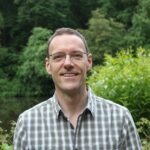
Principal Group Leader, Francis Crick Institute, London, UK
Candidacy Statement
I have been running a Drosophila developmental biology lab since 1998, currently as a Principal Group Leader at the Francis Crick Institute in London. Our lab works on developmental metabolism and most ongoing research aims to understand how the growing CNS is so remarkably spared from many of the worst effects of stresses such as nutrient restriction and hypoxia. We are also actively engaged in technology development in order to generate new tools for metabolic research such as micron resolution mass spectrometry imaging. I consider myself incredibly lucky to have worked with so many talented lab members and, thus far, six have gone on to run their own Drosophila labs. I am a strong supporter of research integrity and DEI initiatives and a trained mentor for ECRs starting their own labs via the Academy of Medical Sciences and also the SUSTAIN–Women in Research programmes. I am also a passionate advocate for the use of Drosophila as a powerful model to study the developmental origins of health and disease (DOHaD) and a member of the International DOHaD Society. Surprised that this clinically relevant area of developmental biology was so understudied, I organized two international meetings to raise awareness and continue to advocate with funders for research in this area. Drosophila has a huge amount to offer here in terms of identifying underlying mechanisms.
I went to my first Annual Drosophila Research Conference in the U.S. as a PhD student in 1990 and have since attended it many times over the years. As an enthusiastic European (even the Brexiteers could not relocate the UK), I regularly attend the European Drosophila Research Conference (EDRC) and co-organised the 2017 meeting. More recently, I was a cofounder of the European Drosophila Society (EDS) and have served since 2021 on the European Drosophila Board, which includes representation from the Fly Board, FlyBase and Vienna Drosophila Resource Center. I am currently serving on four European Drosophila Society working groups: Organisation, Fundraising, EDRC Meetings, and Fly Shipping. The Fly Board was what inspired us to form the European Drosophila Board and I would make the most of the chance to continue strengthening the relationship between both organisations and their communities. This is incredibly important in many areas, not least of which is the funding of our Drosophila databases and community projects.
Nicolás Frankel
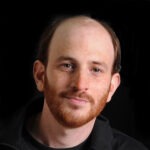
Associate Professor, University of Buenos Aires, Argentina
Candidacy Statement
I obtained my undergraduate (2003) and doctoral (2006) degrees in Biology from the University of Buenos Aires. In 2007, I joined the lab of David Stern in the Department of Ecology and Evolution of Princeton University, where I started working with Drosophila. My postdoc in the Stern Lab (2007–2011) was funded, in part, by a Pew Latin American fellowship. In the Stern Lab I studied gene regulation and the developmental mechanisms underlying morphological evolution in Drosophila. In 2011, I returned to Argentina and in 2012, I opened my lab with a startup grant from Bunge and Born Foundation (Argentina). I am currently an Associate Professor in the Faculty of Science at the University of Buenos Aires and a Group Leader at IFIByNE Institute (UBA-CONICET).
My lab aims to understand the architecture and evolution of regulatory DNA in animal genomes by 1) studying the shavenbaby gene in Drosophila, an established model for the investigation of the structure and evolution of cis-regulatory regions and 2) by analyzing chromatin structure and gene expression genome-wide with high-throughput sequencing technologies. Over the years, we have worked with Drosophila species from the melanogaster, virilis, and repleta groups. My lab has been funded by grants from Argentine agencies (Agencia, CONICET and UBA) and international collaboration grants (Janelia Research Campus-HHMI-US, Royal Society-UK, DFG-Germany). In my lab I have trained three graduate students and 10 undergraduate students. I am currently training five graduate students and one undergraduate student.
I truly enjoy teaching, and I believe it serves as an excellent complement to research. I teach Introductory Genetics, which is a compulsory course for the Biology and Paleontology college degrees at the University of Buenos Aires. As an undergrad tutor, I have guided numerous students in exploring and pursuing career opportunities. I have also participated in graduate courses where I taught Drosophila genetics and the Genetic Bases of Morphological Evolution.
The research conducted by numerous Latin American Drosophila labs often has limited visibility in the broader Drosophila community. If elected for the Fly Board, I hope to contribute to strengthening the bonds between the Latin American and North American communities. Additionally, I will try to advocate for Drosophila research in Latin America.
Nara Muraro

Group Leader, IBioBA-CONICET-MPSP; Professor, University of Buenos Aires, Argentina
Candidacy Statement
I studied Biological Sciences at the University of Buenos Aires, where I completed my undergraduate research thesis in neurodegeneration using rodents. I hated it. However, I realized I loved neuroscience and I wanted a whole animal for my experiments, a simpler one, but still complex enough to be interesting… and of course, Drosophila ticked all the boxes! During my MSc and PhD research at the University of Warwick (UK), I fell in love with flies while studying torp4a, the fly homolog of the torsion dystonia-associated gene. Afterwards, I moved to the University of Manchester for a postdoc at Richard Baines Lab where I became a fly electrophysiologist, focusing on the regulation of voltage-gated sodium channels in synaptic homeostasis.
I returned to my home country as a CONICET (the Argentine Research Council) researcher and I currently lead the Neurobiology of Sleep Lab at the Buenos Aires Biomedical Research Institute (IBioBA), a CONICET institute partnered with the Max Planck Society. In my lab, my talented trainees and I investigate the neural circuits regulating sleep/wake rhythms, using the fruit fly as a model organism. Why study sleep? Because it is a fascinating behavior — and someone has to patch clamp the neurons that control it!
In addition to my research activities, I am a professor at the University of Buenos Aires, where I teach physiology and cell biology to Biology undergrads. Moreover, since 2017 I have been invited annually to teach the prestigious postgraduate course Drosophila Neurobiology: Genes, Circuits and Behavior at Cold Spring Harbor Laboratory. This is always a highlight of my year. There, I get to meet the next generation of Drosophila neuroscientists and spend a few days teaching them that patch clamping fly neurons is hard work but a lot of fun.
The popularization of science is an aspect that I take very seriously. I believe every researcher has a responsibility to give back to society, not only through the outcomes of their work in the lab and classroom but also by fostering opportunities for others to engage with, understand, and contribute to the process of scientific discovery. For this reason, I dedicate part of my time and efforts to science outreach in the framework of different events such as the Night of the Museums of Buenos Aires, Brain Awareness Week, and the IBioBA-Max Planck Open Day, among others. I have also participated in scientific dissemination of the marvels of the fruit fly in different audiovisual formats (written press, internet, YouTube videos, and television). Of note, I am part of a Latin American effort consisting of a website that centralizes resources for education and dissemination of the use of fruit flies in scientific research.
I also devote part of my time to mentoring, with a strong focus on highlighting the importance of diversity in science and advocating for greater representation of women and other underrepresented groups in leadership roles. Since this year, I became part of the Board of Directors of the ALBA Network where we take concrete actions to promote equity and diversity in the brain sciences.
Finally, and very importantly, I am the proud mother of two wonderful teenagers.
It would be an honor for me to serve as the regional representative for Latin America, supporting the Fly Board’s mission to manage community resources and promote Drosophila research.

